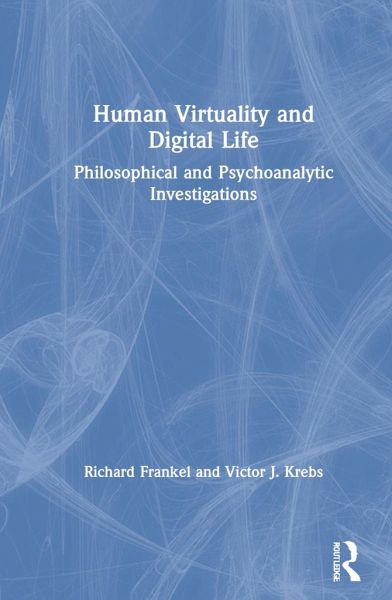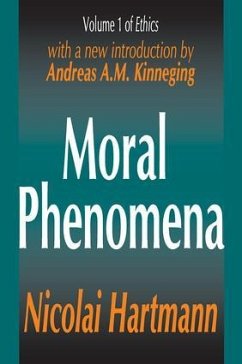Human Virtuality and Digital Life
Philosophical and Psychoanalytic Investigations
Versandkostenfrei!
Versandfertig in 1-2 Wochen
Weitere Ausgaben:

PAYBACK Punkte
81 °P sammeln!





This book is a psychoanalytic and philosophical exploration of how the digital is transforming our perception of the world and our understanding of ourselves.
Richard Frankel, is a faculty member and supervisor at The Massachusetts Institute for Psychoanalysis. He is a teaching associate and supervisor in psychiatry at Harvard Medical School and has a private practice in Cambridge, MA. He is the author of The Adolescent Psyche: Jungian and Winnicottian Perspectives. Victor J. Krebs is professor of philosophy at the Pontifical Catholic University of Peru and philosophical curator at VJKCuraduria Filosófica. He is author of La imaginación pornográfica: contra el escepticismo en la cultura, and editor (with William Day) of Seeing Wittgenstein anew.
Produktdetails
- Verlag: Routledge
- Seitenzahl: 316
- Erscheinungstermin: 13. August 2021
- Englisch
- Abmessung: 240mm x 161mm x 22mm
- Gewicht: 640g
- ISBN-13: 9781138505148
- ISBN-10: 1138505145
- Artikelnr.: 62221160
Herstellerkennzeichnung
Libri GmbH
Europaallee 1
36244 Bad Hersfeld
gpsr@libri.de
ÒWhether we embrace it or resist it, digital communication is one of the defining facts of our times. In their rivetingly thorough and engaging account, Frankel and Krebs show us what psychoanalysis has to do with and do for our digital age. And like all the more interesting psychoanalytical books, it is about far more than psychoanalysis.Ó - Adam Phillips, general editor of the new Penguin Modern Classics translations of Sigmund Freud. Author of On Kissing, Tickling and Being Bored, Going Sane, Side Effects, Missing Out, One Way and Another, and most recently The Cure for Psychoanalysis.
ÒSecluded during the COVID pandemic, I sank into this extraordinary and utterly timely
ÒSecluded during the COVID pandemic, I sank into this extraordinary and utterly timely
Mehr anzeigen
work. Human Virtuality and Digital Life pursues the deeper ambiguities and opportunities of our suddenly, radically digitalized existences. Ranging effortlessly from bison painted on caves to the semiotics of photography to our new Ò0-1Ó worlds, from Plato and Walter Benjamin to D.W Winnicott and Guy Debord, the authors consider the way seeing, thinking, and being will change, the way truth, time, and space will bend, the way our most private possession, our own psyches, will be both impoverished and enriched by what is no longer a dream but is our waking present. A brilliant work.Ó - George Makari, director, DeWitt Wallace Institute of Psychiatry, Weill Cornell Medicine; author of Soul Machine: the Making of the Modern Mind and Revolution in Mind: The Creation of Psychoanalysis.
"This ground-breaking book is a must-read for anybody interested in how the meaning of the human is being reshaped by digital communication. Who are we becoming as we relate to others and to ourselves via social media, and virtual worlds? How are technological enhancements of human life transforming who we are? This book offers exciting new perspectives on these timely questions that broaden tremendously our way of understanding the media-enhanced world that we have created and is (re-)creating us. Viewing technology as a pharmakon that can be both a remedy and a poison, the different chapters offer powerful elucidations of the ways in which the digitalization of our lives has transformed our world and our capacity to experience and imagine. Using insights from both philosophy and psychoanalysis, the book brilliantly explores digital and virtual technology as Òa laboratory of subjectivityÓ that opens up new possibilities for human existence and new configurations of selfhood and otherness. This mesmerizing book is at the forefront of contemporary philosophical discussions of the human and the post-human, and raises provocative questions about technology and the future of humanity that will spark new debates. A masterpiece." - JosZ Medina, Walter Dill Scott Professor of Philosophy at Northwestern University. Author of Speaking from Elsewhere and The Epistemology of Resistance.
"A brilliant articulation of a philosophy of human virtuality for the digital era, conceived in terms of our psychic drives to massify, fracture, and capture our desires, our self-image, and the densities of our lives. The ambivalence and numinosity of digital life in the era of COVID has not found more significant expression. The flow and stoppage of time, truth and post-truth, reality and hyper-reality, beliefs, concepts, images, politics, film, our ancestral bodily capacities: they are all treated here. A sweeping and insightful grasp of technology to bear on our time. A tour de force." - Juliet Floyd, Professor of Philosophy at Boston University. Author (with Felix M hlholzer) of Wittgenstein's Annotations to Hardy's Course of Pure Mathematics.
"This ground-breaking book is a must-read for anybody interested in how the meaning of the human is being reshaped by digital communication. Who are we becoming as we relate to others and to ourselves via social media, and virtual worlds? How are technological enhancements of human life transforming who we are? This book offers exciting new perspectives on these timely questions that broaden tremendously our way of understanding the media-enhanced world that we have created and is (re-)creating us. Viewing technology as a pharmakon that can be both a remedy and a poison, the different chapters offer powerful elucidations of the ways in which the digitalization of our lives has transformed our world and our capacity to experience and imagine. Using insights from both philosophy and psychoanalysis, the book brilliantly explores digital and virtual technology as Òa laboratory of subjectivityÓ that opens up new possibilities for human existence and new configurations of selfhood and otherness. This mesmerizing book is at the forefront of contemporary philosophical discussions of the human and the post-human, and raises provocative questions about technology and the future of humanity that will spark new debates. A masterpiece." - JosZ Medina, Walter Dill Scott Professor of Philosophy at Northwestern University. Author of Speaking from Elsewhere and The Epistemology of Resistance.
"A brilliant articulation of a philosophy of human virtuality for the digital era, conceived in terms of our psychic drives to massify, fracture, and capture our desires, our self-image, and the densities of our lives. The ambivalence and numinosity of digital life in the era of COVID has not found more significant expression. The flow and stoppage of time, truth and post-truth, reality and hyper-reality, beliefs, concepts, images, politics, film, our ancestral bodily capacities: they are all treated here. A sweeping and insightful grasp of technology to bear on our time. A tour de force." - Juliet Floyd, Professor of Philosophy at Boston University. Author (with Felix M hlholzer) of Wittgenstein's Annotations to Hardy's Course of Pure Mathematics.
Schließen
Für dieses Produkt wurde noch keine Bewertung abgegeben. Wir würden uns sehr freuen, wenn du die erste Bewertung schreibst!
Eine Bewertung schreiben
Eine Bewertung schreiben
Andere Kunden interessierten sich für













